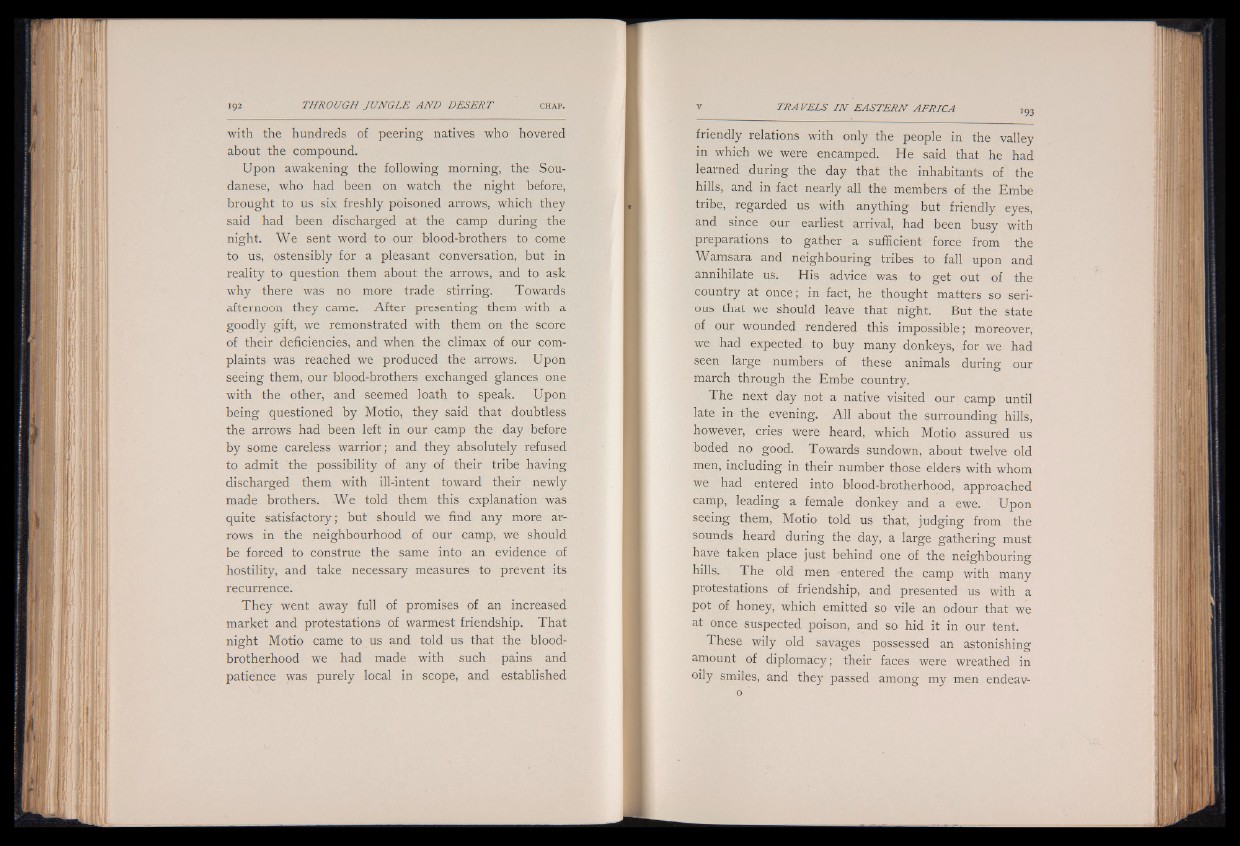
with the hundreds of peering natives who hovered
about the compound.
Upon awakening the following morning, the Soudanese,
who had been on watch the night before,
brought to us six freshly poisoned arrows, which they
said had been discharged at the camp during the
night. We sent word to our blood-brothers to come
to us, ostensibly for a pleasant conversation, but in
reality to question them about the arrows, and to ask
why there was no more trade stirring. Towards
afternoon they came. After presenting them with a
goodly gift, we remonstrated with them on the score
of their deficiencies, and when the climax of our complaints
was reached we produced the arrows. Upon
seeing them, our blood-brothers exchanged glances one
with the other, and seemed loath to speak. Upon
being questioned by Motio, they said that doubtless
the arrows had been left in our camp the day before
by some careless warrior; and they absolutely refused
to admit the possibility of any of their tribe having
discharged them with ill-intent toward their newly
made brothers. We told them this explanation was
quite satisfactory; but should we find any more arrows
in the neighbourhood of our camp, we should
be forced to construe the same into an evidence of
hostility, and take necessary measures to prevent its
recurrence.
They went away full of promises of an increased
market and protestations of warmest friendship. That
night Motio came to us and told us that the blood-
brotherhood we had made with such pains and
patience was purely local in scope, and established
friendly relations with only the people in the valley
in which we were encamped. He said that he had
learned during the day that the inhabitants of the
hills, and in fact nearly all the members of the Embe
tribe, regarded us with anything but friendly eyes,
and since our earliest arrival, had been busy with
preparations to gather a sufficient force from the
Wamsara and neighbouring tribes to fall upon and
annihilate us. His advice was to get out of the
country at once; in fact, he thought matters so serious
that we should leave that night. But the state
of our wounded rendered this impossible; moreover,
we had expected to buy many donkeys, for we had
seen large numbers of these animals during our
march through the Embe country.
The next day not a native visited our camp until
late in the evening. All about the surrounding hills,
however, cries were heard, which Motio assured us
boded no good. Towards sundown, about twelve old
men, including in their number those elders with whom
we had entered into blood-brotherhood, approached
camp, leading a female donkey and a ewe. Upon
seeing them, Motio told us that, judging from the
sounds heard during the day, a large gathering must
have taken place just behind one of the neighbouring
hills. The old men entered the camp with many
protestations of friendship, and presented us with a
pot of honey, which emitted so vile an odour that we
at once suspected poison, and so hid it in our tent.
These wily old savages possessed an astonishing
amount of diplomacy; their faces were wreathed in
oily smiles, and they passed among my men endeav-
o